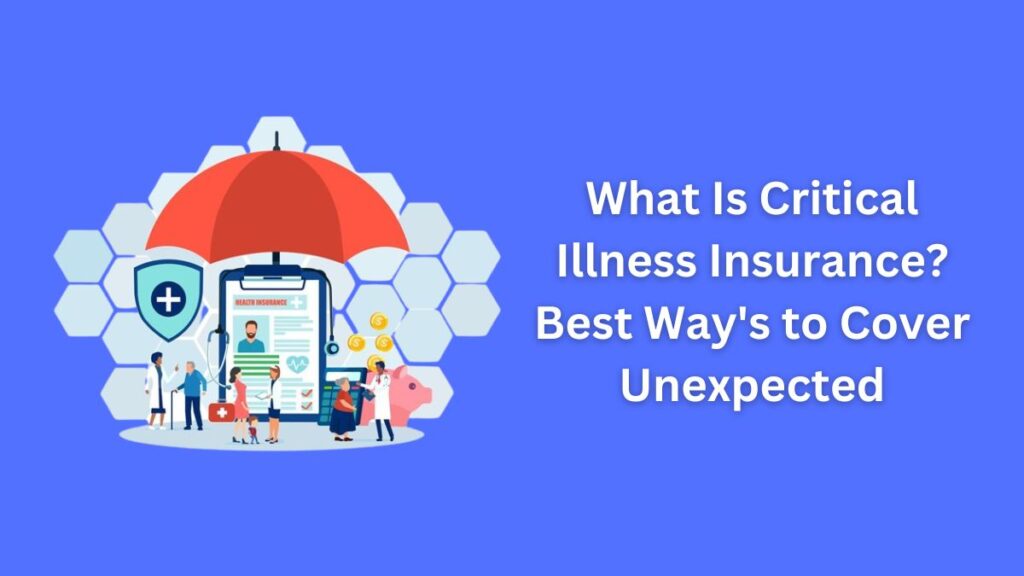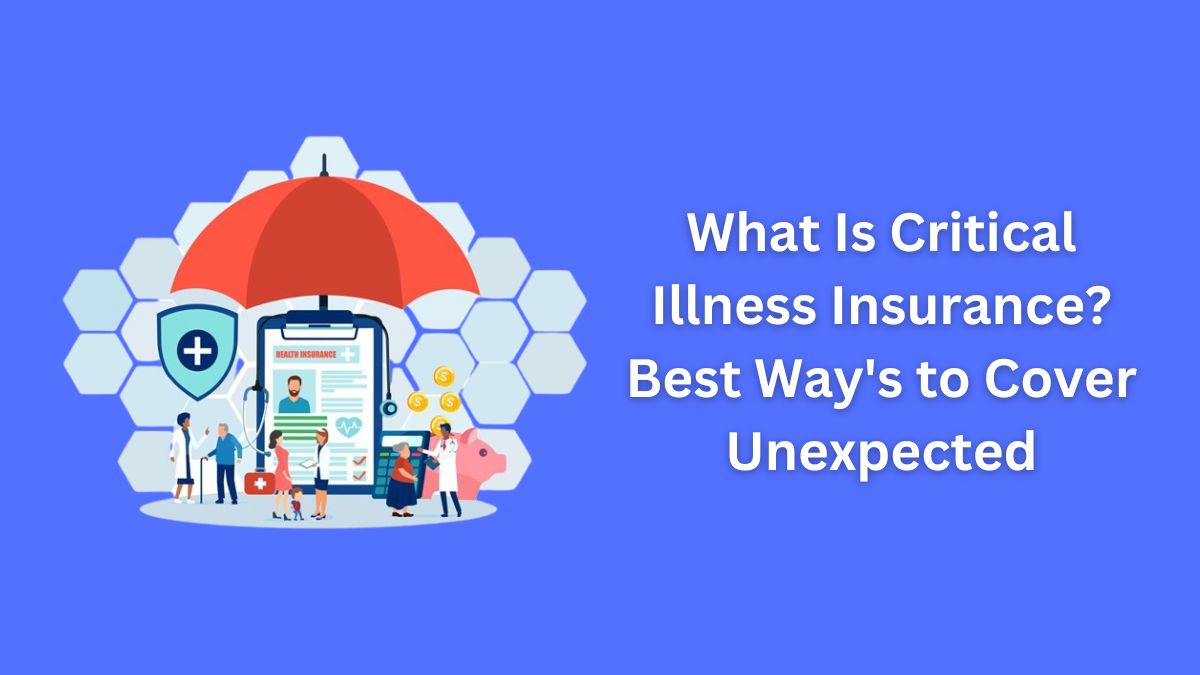In today’s fast-paced world, unexpected health crises can strike anyone at any time, wreaking havoc on both physical and financial well-being.

Amidst such uncertainties, critical illness insurance emerges as a beacon of financial security, offering a safety net to individuals and families grappling with the aftermath of a serious medical diagnosis. The emotional toll of battling a critical illness is daunting enough without the added stress of financial strain.
This is where critical illness insurance steps in, providing a much-needed cushion to alleviate some of the burdens associated with medical expenses, household bills, and other financial obligations.
Understanding Critical Illness Insurance
Navigating the complexities of critical illness insurance requires a comprehensive understanding of its fundamental principles and coverage options.
Unlike traditional health insurance plans, which primarily cover routine medical expenses, critical illness insurance offers a lump sum payment upon the diagnosis of a covered condition.
These conditions typically include life-altering illnesses such as cancer, heart attack, stroke, organ failure, and more. The lump sum payment provided by critical illness insurance is designed to offer flexibility, allowing policyholders to allocate funds according to their unique needs and priorities.
Whether it’s covering medical bills, seeking alternative treatments, or maintaining a semblance of normalcy amidst adversity, critical illness insurance offers invaluable peace of mind during turbulent times.
The Benefits of Critical Illness Insurance
The benefits of critical illness insurance extend far beyond financial compensation. At its core, critical illness insurance provides a sense of security and reassurance, knowing that one’s financial future is safeguarded against the uncertainties of life.
Beyond the financial aspect, critical illness insurance also offers emotional support, enabling individuals to focus on their recovery journey without the looming specter of financial ruin.
Moreover, critical illness insurance serves as a proactive measure, encouraging individuals to prioritize their health and well-being by seeking timely medical attention and preventive care. By offering a safety net in times of crisis, critical illness insurance empowers individuals to face life’s challenges with resilience and confidence.
Choosing the Right Critical Illness Insurance Policy
Selecting the right critical illness insurance policy requires careful consideration and due diligence. With a myriad of options available in the market, it’s essential to assess your specific needs, budget constraints, and long-term objectives before making a decision.
Begin by evaluating the coverage options offered by different insurance providers, ensuring they align with your individual needs and priorities. Pay close attention to policy terms and conditions, including coverage limits, waiting periods, and exclusions. Additionally, consider factors such as premiums, deductibles, and provider reputation when comparing policies.
Researching customer reviews and testimonials can provide valuable insights into the overall customer experience and claims process. By conducting thorough research and seeking guidance from insurance experts, you can make an informed decision that offers both financial protection and peace of mind.
Navigating the Claims Process
The claims process for critical illness insurance can seem daunting, especially during times of emotional distress. However, understanding the necessary steps and requirements can streamline the process and ensure a smoother experience.
The first step is to notify your insurance provider of the critical illness diagnosis as soon as possible. This triggers the claims process and initiates the assessment of your claim. Provide all necessary documentation, including medical records, diagnostic reports, and any other relevant information requested by your insurance provider.
Accuracy and transparency are key during this stage, as any discrepancies or missing information could delay the processing of your claim.
Follow any instructions provided by your insurance provider diligently, ensuring that all required forms are completed accurately and submitted within the specified timeframe. Keep detailed records of all communications with your insurance provider, including dates, times, and the names of individuals you spoke with.
This documentation can serve as valuable evidence in case of any disputes or discrepancies during the claims process. If you encounter challenges or have questions at any point during the process, don’t hesitate to reach out to your insurance provider for assistance. Additionally, consider seeking guidance from a trusted advisor or legal professional who can provide expert support and advocacy on your behalf.
What is critical illness insurance
Critical illness insurance is a specialized type of insurance policy that provides a lump sum payment upon the diagnosis of a covered serious medical condition. These conditions typically include life-threatening illnesses such as cancer, heart attack, stroke, organ failure, and more.
The lump sum payment provided by critical illness insurance can be used to cover medical expenses, household bills, and other financial obligations, offering financial security and peace of mind during challenging times.
Who needs critical illness insurance
Critical illness insurance is recommended for anyone concerned about the potential financial impact of a serious illness. Whether you’re young and healthy or have pre-existing medical conditions, critical illness insurance offers valuable protection against the unexpected.
By providing a lump sum payment upon the diagnosis of a covered condition, critical illness insurance ensures that you and your loved ones are financially secure, regardless of the medical challenges you may face.
How much critical illness insurance coverage do I need
Determining the appropriate amount of critical illness insurance coverage depends on various factors, including your financial obligations, lifestyle, and existing health insurance coverage. Consider factors such as your monthly expenses, outstanding debts, and potential medical costs when assessing your coverage needs.
It’s essential to strike a balance between adequate coverage and affordability, ensuring that you have enough financial protection without overextending your budget.
Can I purchase critical insurance if I have pre-existing conditions
Yes, it is possible to purchase critical insurance even if you have pre-existing medical conditions. However, the availability of coverage and the specific conditions covered may vary depending on the insurance provider and policy terms.
Some insurers may impose exclusions or limitations on pre-existing conditions, while others may offer coverage with certain restrictions or higher premiums. It’s essential to shop around and compare policies to find one that meets your needs and provides the necessary coverage for your medical history.
What happens if I don’t use the critical insurance payout for medical expenses
Unlike traditional health insurance, critical illness insurance payouts are not tied to specific medical expenses. Once you receive the lump sum payment from your insurance provider, you have the flexibility to use the funds as needed.
Whether it’s covering medical bills, household expenses, or other financial obligations, the decision on how to allocate the funds is entirely up to you. Critical illness insurance provides financial security and peace of mind, allowing you to focus on your recovery journey without the added stress of financial worries.
How do I file a claim for critical illness insurance
Filing a claim for critical insurance involves several steps, beginning with notifying your insurance provider of the diagnosis. Once you receive a confirmed diagnosis of a covered condition, contact your insurance provider as soon as possible to initiate the claims process.
Provide all necessary documentation to support your claim, including medical records, diagnostic reports, and any other requested information. Follow any instructions provided by your insurance provider carefully, ensuring that all required forms are completed accurately and submitted within the specified timeframe.
Keep detailed records of all communications with your insurance provider, including dates, times, and the names of individuals you spoke with. If you encounter challenges or have questions during the claims process, don’t hesitate to reach out to your insurance provider for assistance. Seeking guidance from a trusted advisor or legal professional can also help ensure a smooth and successful claims experience.
Must Read:-
- What is Health Insurance Agency? Best Way’s to Your Guide to Making Informed Decisions in 2024
- What is Private Health Insurance: Best Way’s to Your Comprehensive Guide in 2024
- How Much is Commercial Auto Insurance? Best Way’s to fulfill you plan in 2024
Critical Illness Insurance related [FAQs]
Q1. What is illness insurance?
Critical insurance is a type of insurance policy that provides a lump sum payment upon diagnosis of a covered serious medical condition, such as cancer, heart attack, or stroke.
Q2. Who needs illness insurance?
Anyone concerned about the financial impact of a serious illness should consider critical illness insurance. It can provide financial protection and peace of mind for individuals and families facing unexpected health challenges.
Q3. How much illness insurance coverage do I need?
The amount of coverage you need depends on various factors, including your financial obligations, existing health insurance coverage, and personal circumstances. It’s essential to assess your needs carefully and choose a policy that provides adequate coverage.
Q4. Can I purchase illness insurance if I have pre-existing conditions?
Some insurance providers may offer critical illness insurance to individuals with pre-existing conditions, but coverage options and premiums may vary. It’s essential to shop around and compare policies to find one that meets your needs.
Q5. What happens if I don’t use the illness insurance payout for medical expenses?
Unlike traditional health insurance, illness insurance payouts are not tied to specific medical expenses. You have the flexibility to use the funds as needed, whether for medical bills, household expenses, or other financial obligations.
Q6. How do I file a claim for illness insurance?
To file a claim for critical illness insurance, you must notify your insurance provider of your diagnosis and follow their instructions for the claims process. Provide all necessary documentation, including medical records and diagnosis details, to support your claim
Conclusion
Critical illness insurance offers invaluable financial protection and peace of mind in the face of life’s uncertainties. By understanding the importance of critical illness insurance, exploring coverage options, and selecting the right policy, individuals can safeguard their financial future and focus on what matters most—health, happiness, and resilience in the face of adversity.
Whether you’re young and healthy or facing pre-existing medical conditions, critical illness insurance provides a safety net that ensures you and your loved ones are protected against the unexpected. By taking proactive steps to secure critical illness insurance coverage, you can rest assured knowing that you’re prepared for whatever the future may hold.
